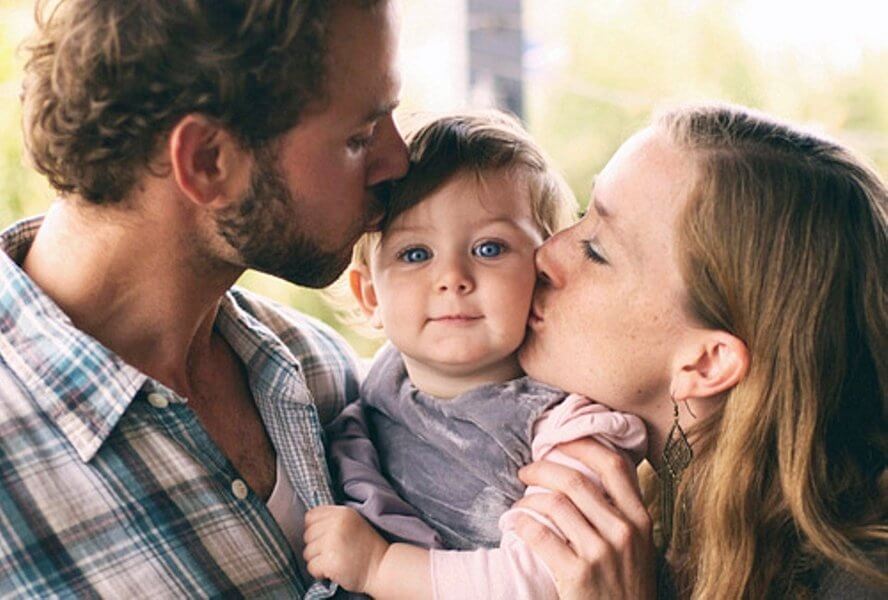Consequences of Fighting in Front of Your Child


Written and verified by the psychologist Bernardo Peña
Fighting in front of our children is one of the worst things that we can do as parents. It results in feelings of insecurity, and so we need to be aware of what we’re doing.
Arguments are a part of relationships, sometimes a necessary part of problem-solving. However, what we need to avoid is arguments turning into fights. Most importantly: we need to stop fighting in front of our children.
Kids who witness physical and verbal fights experience anxiety that later transforms into anger, sadness, or fear. When they’re babies, the psychological consequences are worse.
Consequences of Fighting in Front of Your Child
1. Subconscious Level When They Are Babies

Newborns are capable of subconsciously registering in their brain the moods of people around them, including their tone of voice and gestures. Just like how they perceive love around them, they also can feel when the situation is tense, when your tone of voice is angry and when your face is aggressive.
2. Their Emotional Development
No matter how “minor” the fighting is, growing up in a tense family environment can cause deep emotional wounds because it leads to problems like anxiety and low self-esteem. A peaceful environment, where children are not involved in the adults’ conflicts, will help them develop better.
Check this out too:
The Fabulous Benefits of Yoga for Kids
3. Preschoolers
At this age, the child has not completely developed in regards to language, and looks to express themselves through non-verbal communication. Therefore, after a fight they may cry or throw a temper tantrum.
Kids in preschool still don’t understand the causes of conflict, and their egocentric thoughts make them feel like they caused it, leading them to feel guilty for making their parents fight.
The reactions vary in each child. Some act as if it’s no problem, but others may fear that something horrible is happening and isolate themselves from the world until they feel secure.
They usually express their feelings through changes in their sleep or eating patterns. They could regress to previous stages of development like wetting the bed. Preschoolers may become irritable or aggressive.
4. Elementary Kids

At this age, children begin to understand what is going on around them. They may feel shocked or anxious when they see their parents fighting. Because they feel guilty, they think they need to take a side; girls tend to side with their mothers, while the boys tend to side with their fathers.
How Does “Minor” But Frequent Fighting Affect Kids?
In general, this kind of fighting underlies an unstable family environment. In an environment like this, the child understands that a small thing can blow up into a huge issue.
It can cause the child to feel that they need to control the situation. Also, they may respond by not expressing their true needs in order to avoid causing a problem.
Kids and Insults
You should never use your child to insult or oppose their father or mother, especially if you are separated. It’s important to be deliberate about not fighting at night when the child is sleeping, since sleep is crucial for children. Fights happen in all families, but use them to show your child that everybody is different. You want your child to grow up in a happy home.
No Fighting Around Your Kids

Fights should always take place when the children are not around. They may know that their parents have fought, but at least they won’t feel a part of the fight themselves. Kids, especially younger ones, aren’t capable of interpreting beyond the face value of words; they believe what they hear.
If they hear their parents saying things like, “That’s enough!” “I’m sick of you!” “I don’t want to see you again!” then not only will they feel hurt, but they will also be insecure because their parents might separate.
Family Therapy
Going to therapy as a couple, if you’re having problems, will improve communication. Family therapy is ideal when the child begins to behave poorly or present psychosomatic symptoms that require professional intervention. Therapy can go a long way in fostering positive relationships among family members.
Talk With Your Children
Sometimes it’s impossible to avoid fighting in front of your kids. In these cases, it’s important to explain to them that all people fight, even people that love each other. Use this opportunity to explain that arguments don’t mean that you don’t care for one another.
If the conflict is resolved, you can enjoy family activities together; but if this is not the case, don’t fake it, because kids can feel the tension.
Parents as Models

Keep in mind that parents are the primary role models for their children. Seeing one parent treating the other one poorly, whether physically or verbally or otherwise, creates a deep would that can have terrible consequences in the child’s personality and in the adult that they will become. It also affects their relationships with their friends and classmates.
Let’s teach them that when people have different views and opinions on a topic, you can always use kind words. Let’s create an environment of tolerance and respect, without needing to get mad, yell, or say mean things.
All cited sources were thoroughly reviewed by our team to ensure their quality, reliability, currency, and validity. The bibliography of this article was considered reliable and of academic or scientific accuracy.
- Morris, A. S., Silk, J. S., Steinberg, L., Myers, S. S., & Robinson, L. R. (2007). The role of the family context in the development of emotion regulation. Social Development. https://doi.org/10.1111/j.1467-9507.2007.00389.x
- Kim, I. H., Anderson, R. C., Nguyen-Jahiel, K., & Archodidou, A. (2007). Discourse patterns during children’s collaborative online discussions. Journal of the Learning Sciences. https://doi.org/10.1080/10508400701413419
- Blankenship, K. M., Friedman, S. R., Dworkin, S., & Mantell, J. E. (2006). Structural interventions: Concepts, challenges and opportunities for research. In Journal of Urban Health. https://doi.org/10.1007/s11524-005-9007-4
This text is provided for informational purposes only and does not replace consultation with a professional. If in doubt, consult your specialist.








